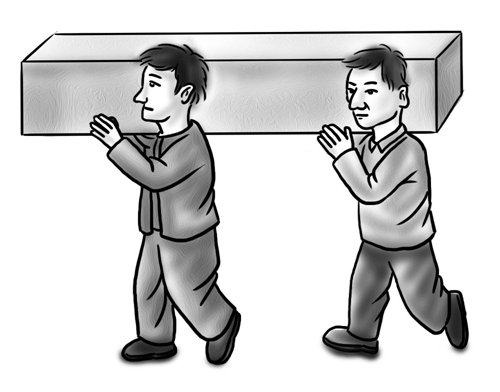
Illustration: Xia Qing/GT
There is a growing view that privately owned enterprises may be facing their most difficult period since 1992. The Chinese economy has experienced many ups and downs, but such pessimism is still rare among private entrepreneurs, and this deserves a high degree of attention from policymakers.
In the domestic capital market, the high ratio of stock pledge agreements is posing an increasing risk, and externally China is facing a trade battle with the US.
Both internal and external problems have had a negative impact on market confidence. Timely and scientific measures should be taken to handle the risks, in particular to prevent a possible chain reaction triggered by the forced sale of pledged stocks.
Just to be clear, it's not that there should be a bailout by the government. However, if we do nothing to the existing policies, it is very likely that many private enterprises will be forced to sell their positions, and the losses incurred may lead to a change of company ownership.
When it comes to policy adjustment, there are two things that should be considered. First, macro control cannot replace reform. Over the past few years, China's policymakers have regarded macroeconomic policies as a tool for structural reform. With no substantial progress seen in structural reform, this practice has only exacerbated market volatility, which has hurt the private sector.
China's reform has entered a "deep-water zone," where it is difficult to make drastic changes. By contrast, it is relatively easy to implement macro controls, with effects that can be seen quickly. This has led to the undesirable situation that we are increasingly inclined to use macro control policies instead of reform.
Take the financial reforms for local governments as an example. Although the central government has allowed local governments to issue their own debt, many have still borrowed far more than they should through opaque local government financing vehicles. Also, due to the new asset management rules issued in 2018, banks can no longer offer shadow banking services through off-balance-sheet wealth management products, thus cutting off the financing supply for many projects backed by local governments. This has affected downstream enterprises. While the impact on SOEs may be limited because they can still obtain low-cost financing relatively easily, it can be fatal for many private enterprises.
This is a typical example of replacing reform with macro controls. The central government tightened liquidity, but local governments can still skirt the rules and build up debts, which ends up hurting private enterprises.
Thorough reform of institutional mechanisms is needed to change the behavior pattern of local governments. Before that, the central government should relax restrictions on local governments' debts and make the total amount and debt details clear and transparent so as to set a ceiling on the overall size of the debt issuance. To a certain extent, this can avoid replacing reform with macro controls.
Second, there shouldn't be too much concern about liquidity. China's debt level is certainly high, especially in terms of corporate debts. But a high debt level alone doesn't mean there is necessarily a problem with the financial system. China's economic growth is real, and new housing and high-speed railways all represent social progress.
In fact, the high debt level and ample liquidity can be attributed to the country's financing structure. China's social financing has increased by more than 10 trillion yuan annually, but direct financing only accounts for about 30 percent of the total. So bank loans are still the main source of financing and liquidity. Without any major change in the financing structure, drastic deleveraging will only cause unnecessary pain.
In the case of this round of deleveraging, the authorities stepped up the pressure on banks to move their off-balance-sheet assets onto their balance sheets, squeezing the shadow lending channel for private enterprises that are unable to borrow through conventional channels.
There is a concern that excessive liquidity could generate problems and too much debt should indeed be avoided, but this must be resolved through hard reforms instead of more monetary tightening.
SOE reform should be the top priority in the reform agenda for monetary issues. While most of the listed A-share companies are privately owned, the market capitalization of private companies only accounts for about 7 percent of the entire market. That's because the vast majority of funds have flowed to SOEs, which still enjoy easy financing at low costs. In this sense, fundamentally advancing SOE reform is necessary for proper deleveraging. This country should not try to get around the real obstacles facing China's reform.
The article was compiled based on a speech by Yao Yang, dean of the National School of Development of Peking University, at a forum on September 20. bizopinion@globaltimes.com.cn




